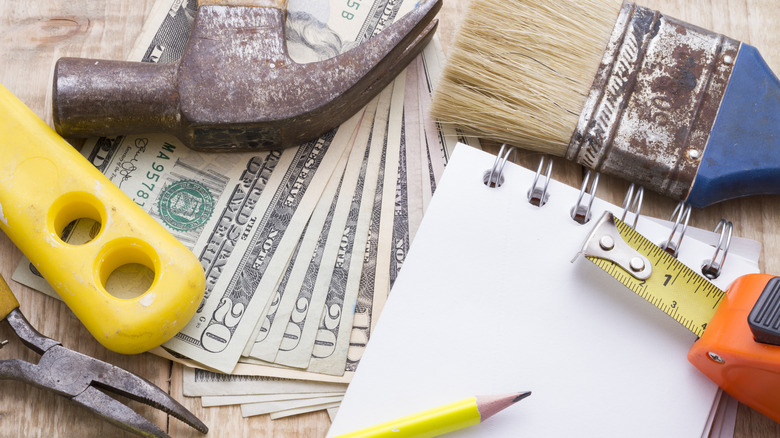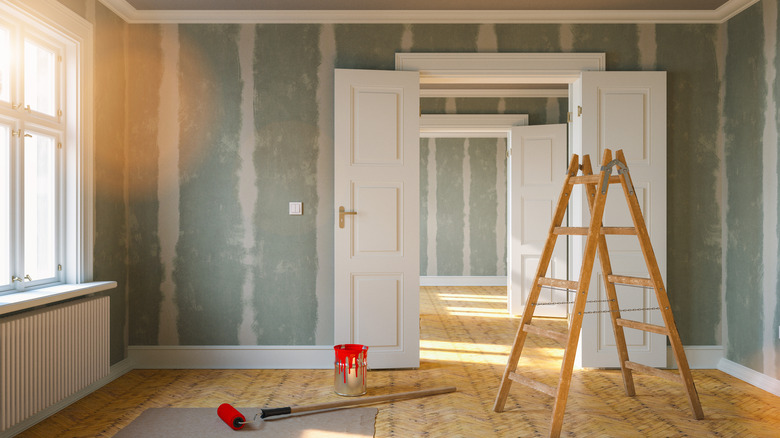Signs You Shouldn't Undertake The Renovation You Have Planned
There are a lot of reasons why we make home improvements. Sometimes, it's to make your home more functional or better represent your style and interests. Other times, the constant problems with an overflowing toilet or a leaking roof make certain renovations necessary.
Reborn Home Solutions also notes that some home improvements can save you money because newer, better materials hold up to wear and tear. It may even help you to relax a bit easier in a home you feel comfortable and secure in. Other revisions are fantastic for helping you to save money on energy use or may even increase the value of your home should you decide to sell. However, not every so-called improvement brings the desired results — there are some situations when you simply should not take on the home renovation because doing so could be a big, costly mistake. Here are some prime examples.
You're after the lowest cost
Home remodeling projects can add value and improve your home's look and feel, but if they are not done properly, they can cost you big time. It may seem tempting enough to cut some corners, especially if those tasks are likely to significantly add to the project's cost. Doing so can be a costly mistake.
Treeium says there are three main areas where you shouldn't ever seek out the least expensive solution. The first is hiring unprofessional, unlicensed contractors. While some projects are essentially DIY tasks, other times, a lack of knowledge will invariably lead to problems later on. You also want to be sure you are getting expert design services since just winging it could cause problems with the structural integrity of a project. Finally, don't ever avoid getting the necessary permits. A reliable and trustworthy contractor wouldn't skip them, even if you think the city won't know you're doing work.
You haven't counted the cost
Renovations cost lots of money, and sometimes that means a significant amount to pull from your savings account. There are situations where a low-interest rate loan can help you to cover those costs, but it's also critically important to ensure you're prepared for the expenses to come.
Doing thorough research on the estimated cost of a home renovation is a good start. This estimate is dependent on the tasks you are completing, the scope of the project, and even your location. Rocket Mortgage provides some tools to help with breaking down those costs. For example, they estimate the average cost to renovate a bathroom to be about $24,000, while the mid-range cost of renovating a kitchen is about $75,000. To get a better idea of what applies in your situation, get estimates from a few contractors that outline all of the expenses you will need to pay.
No contingency plan
Once you have an idea of the costs, you may believe you're all set to go. However, that's not always the case because the unexpected waits for you under those floors or behind the wall in the bathroom, and it's often not pretty. Overages in costs are common in renovations of all sizes, and there's no real way to know how much of a financial implication the unknown could have. You may not want to pursue a project if you cannot manage those unexpected costs.
House Method states it's best to budget about 20% (and sometimes more) over your estimated cost for those just-in-case moments. If you are working with a contractor, they should be able to provide some insight into what to keep in mind. In the best situation, you don't have to spend the money, but in the worst, if a big problem does exist, you're not stuck without the funds to move forward.
It's possible to over-improve your home
Making your individual to you and your family is certainly worth doing, but it is also possible to over-improve the home, which means you're putting more money into your home than you can get out of it. This can happen in various ways. For example, you may be adding value to your home with features or high-quality craftsmanship. Yet, if homes in your area do not sell above a certain dollar point, that means you will not recoup those funds, says Moving.com.
Factors like the home's square meter footage and the neighborhood itself often limit the appreciation of the home's value beyond a certain point. This isn't a problem if you don't plan to move and the renovations suit your needs. However, if you plan to sell within the next few years, be careful how much you put into your home, and speak to a real estate agent if you're not sure of what to expect.
Your schedule is too tight
Another instance when it may be best to just hold off on completing renovations is when you don't have ample time to put towards the project. Each project is different, with some timelines ranging from a day to months. Yet, like with costs, timelines need to be flexible to account for the many things that could go wrong. Riverstone Kitchens points out that there's a lot that could go wrong, such as DIY errors, unknown water damage or pests, back orders on products due to supply chain slowdowns, or even contractor scheduling problems.
If you're trying to get a project done in a very limited amount of time, you may not be able to accomplish that goal no matter how hard you work. sometimes, it may just be better to wait until you have a bit more time to avoid a home improvement being anything but that.





